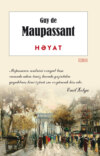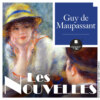Kitabı oku: «Complete Original Short Stories of Guy De Maupassant», sayfa 93
REGRET
Monsieur Saval, who was called in Mantes “Father Saval,” had just risen from bed. He was weeping. It was a dull autumn day; the leaves were falling. They fell slowly in the rain, like a heavier and slower rain. M. Saval was not in good spirits. He walked from the fireplace to the window, and from the window to the fireplace. Life has its sombre days. It would no longer have any but sombre days for him, for he had reached the age of sixty-two. He is alone, an old bachelor, with nobody about him. How sad it is to die alone, all alone, without any one who is devoted to you!
He pondered over his life, so barren, so empty. He recalled former days, the days of his childhood, the home, the house of his parents; his college days, his follies; the time he studied law in Paris, his father’s illness, his death. He then returned to live with his mother. They lived together very quietly, and desired nothing more. At last the mother died. How sad life is! He lived alone since then, and now, in his turn, he, too, will soon be dead. He will disappear, and that will be the end. There will be no more of Paul Saval upon the earth. What a frightful thing! Other people will love, will laugh. Yes, people will go on amusing themselves, and he will no longer exist! Is it not strange that people can laugh, amuse themselves, be joyful under that eternal certainty of death? If this death were only probable, one could then have hope; but no, it is inevitable, as inevitable as that night follows the day.
If, however, his life had been full! If he had done something; if he had had adventures, great pleasures, success, satisfaction of some kind or another. But no, nothing. He had done nothing, nothing but rise from bed, eat, at the same hours, and go to bed again. And he had gone on like that to the age of sixty-two years. He had not even taken unto himself a wife, as other men do. Why? Yes, why was it that he had not married? He might have done so, for he possessed considerable means. Had he lacked an opportunity? Perhaps! But one can create opportunities. He was indifferent; that was all. Indifference had been his greatest drawback, his defect, his vice. How many men wreck their lives through indifference! It is so difficult for some natures to get out of bed, to move about, to take long walks, to speak, to study any question.
He had not even been loved. No woman had reposed on his bosom, in a complete abandon of love. He knew nothing of the delicious anguish of expectation, the divine vibration of a hand in yours, of the ecstasy of triumphant passion.
What superhuman happiness must overflow your heart, when lips encounter lips for the first time, when the grasp of four arms makes one being of you, a being unutterably happy, two beings infatuated with one another.
M. Saval was sitting before the fire, his feet on the fender, in his dressing gown. Assuredly his life had been spoiled, completely spoiled. He had, however, loved. He had loved secretly, sadly, and indifferently, in a manner characteristic of him in everything. Yes, he had loved his old friend, Madame Sandres, the wife of his old companion, Sandres. Ah! if he had known her as a young girl! But he had met her too late; she was already married. Unquestionably, he would have asked her hand! How he had loved her, nevertheless, without respite, since the first day he set eyes on her!
He recalled his emotion every time he saw her, his grief on leaving her, the many nights that he could not sleep, because he was thinking of her.
On rising in the morning he was somewhat more rational than on the previous evening.
Why?
How pretty she was formerly, so dainty, with fair curly hair, and always laughing. Sandres was not the man she should have chosen. She was now fifty-two years of age. She seemed happy. Ah! if she had only loved him in days gone by; yes, if she had only loved him! And why should she not have loved him, he, Saval, seeing that he loved her so much, yes, she, Madame Sandres!
If only she could have guessed. Had she not guessed anything, seen anything, comprehended anything? What would she have thought? If he had spoken, what would she have answered?
And Saval asked himself a thousand other things. He reviewed his whole life, seeking to recall a multitude of details.
He recalled all the long evenings spent at the house of Sandres, when the latter’s wife was young, and so charming.
He recalled many things that she had said to him, the intonations of her voice, the little significant smiles that meant so much.
He recalled their walks, the three of them together, along the banks of the Seine, their luncheon on the grass on Sundays, for Sandres was employed at the sub-prefecture. And all at once the distinct recollection came to him of an afternoon spent with her in a little wood on the banks of the river.
They had set out in the morning, carrying their provisions in baskets. It was a bright spring morning, one of those days which intoxicate one. Everything smells fresh, everything seems happy. The voices of the birds sound more joyous, and-they fly more swiftly. They had luncheon on the grass, under the willow trees, quite close to the water, which glittered in the sun’s rays. The air was balmy, charged with the odors of fresh vegetation; they drank it in with delight. How pleasant everything was on that day!
After lunch, Sandres went to sleep on the broad of his back. “The best nap he had in his life,” said he, when he woke up.
Madame Sandres had taken the arm of Saval, and they started to walk along the river bank.
She leaned tenderly on his arm. She laughed and said to him: “I am intoxicated, my friend, I am quite intoxicated.” He looked at her, his heart going pit-a-pat. He felt himself grow pale, fearful that he might have looked too boldly at her, and that the trembling of his hand had revealed his passion.
She had made a wreath of wild flowers and water-lilies, and she asked him: “Do I look pretty like that?”
As he did not answer – for he could find nothing to say, he would have liked to go down on his knees – she burst out laughing, a sort of annoyed, displeased laugh, as she said: “Great goose, what ails you? You might at least say something.”
He felt like crying, but could not even yet find a word to say.
All these things came back to him now, as vividly as on the day when they took place. Why had she said this to him, “Great goose, what ails you? You might at least say something!”
And he recalled how tenderly she had leaned on his arm. And in passing under a shady tree he had felt her ear brushing his cheek, and he had moved his head abruptly, lest she should suppose he was too familiar.
When he had said to her: “Is it not time to return?” she darted a singular look at him. “Certainly,” she said, “certainly,” regarding him at the same time in a curious manner. He had not thought of it at the time, but now the whole thing appeared to him quite plain.
“Just as you like, my friend. If you are tired let us go back.”
And he had answered: “I am not fatigued; but Sandres may be awake now.”
And she had said: “If you are afraid of my husband’s being awake, that is another thing. Let us return.”
On their way back she remained silent, and leaned no longer on his arm. Why?
At that time it had never occurred to him, to ask himself “why.” Now he seemed to apprehend something that he had not then understood.
Could it?
M. Saval felt himself blush, and he got up at a bound, as if he were thirty years younger and had heard Madame Sandres say, “I love you.”
Was it possible? That idea which had just entered his mind tortured him. Was it possible that he had not seen, had not guessed?
Oh! if that were true, if he had let this opportunity of happiness pass without taking advantage of it!
He said to himself: “I must know. I cannot remain in this state of doubt. I must know!” He thought: “I am sixty-two years of age, she is fifty-eight; I may ask her that now without giving offense.”
He started out.
The Sandres’ house was situated on the other side of the street, almost directly opposite his own. He went across and knocked at the door, and a little servant opened it.
“You here at this hour, Saval! Has some accident happened to you?”
“No, my girl,” he replied; “but go and tell your mistress that I want to speak to her at once.”
“The fact is madame is preserving pears for the winter, and she is in the preserving room. She is not dressed, you understand.”
“Yes, but go and tell her that I wish to see her on a very important matter.”
The little servant went away, and Saval began to walk, with long, nervous strides, up and down the drawing-room. He did not feel in the least embarrassed, however. Oh! he was merely going to ask her something, as he would have asked her about some cooking recipe. He was sixty-two years of age!
The door opened and madame appeared. She was now a large woman, fat and round, with full cheeks and a sonorous laugh. She walked with her arms away from her sides and her sleeves tucked up, her bare arms all covered with fruit juice. She asked anxiously:
“What is the matter with you, my friend? You are not ill, are you?”
“No, my dear friend; but I wish to ask you one thing, which to me is of the first importance, something which is torturing my heart, and I want you to promise that you will answer me frankly.”
She laughed, “I am always frank. Say on.”
“Well, then. I have loved you from the first day I ever saw you. Can you have any doubt of this?”
She responded, laughing, with something of her former tone of voice.
“Great goose! what ails you? I knew it from the very first day!”
Saval began to tremble. He stammered out: “You knew it? Then.”
He stopped.
She asked:
“Then?”
He answered:
“Then – what did you think? What – what – what would you have answered?”
She broke into a peal of laughter. Some of the juice ran off the tips of her fingers on to the carpet.
“What?”
“I? Why, you did not ask me anything. It was not for me to declare myself!”
He then advanced a step toward her.
“Tell me – tell me.. You remember the day when Sandres went to sleep on the grass after lunch.. when we had walked together as far as the bend of the river, below.”
He waited, expectantly. She had ceased to laugh, and looked at him, straight in the eyes.
“Yes, certainly, I remember it.”
He answered, trembling all over:
“Well – that day – if I had been – if I had been – venturesome – what would you have done?”
She began to laugh as only a happy woman can laugh, who has nothing to regret, and responded frankly, in a clear voice tinged with irony:
“I would have yielded, my friend.”
She then turned on her heels and went back to her jam-making.
Saval rushed into the street, cast down, as though he had met with some disaster. He walked with giant strides through the rain, straight on, until he reached the river bank, without thinking where he was going. He then turned to the right and followed the river. He walked a long time, as if urged on by some instinct. His clothes were running with water, his hat was out of shape, as soft as a rag, and dripping like a roof. He walked on, straight in front of him. At last, he came to the place where they had lunched on that day so long ago, the recollection of which tortured his heart. He sat down under the leafless trees, and wept.
A SISTER’S CONFESSION
Marguerite de Therelles was dying. Although she was-only fifty-six years old she looked at least seventy-five. She gasped for breath, her face whiter than the sheets, and had spasms of violent shivering, with her face convulsed and her eyes haggard as though she saw a frightful vision.
Her elder sister, Suzanne, six years older than herself, was sobbing on her knees beside the bed. A small table close to the dying woman’s couch bore, on a white cloth, two lighted candles, for the priest was expected at any moment to administer extreme unction and the last communion.
The apartment wore that melancholy aspect common to death chambers; a look of despairing farewell. Medicine bottles littered the furniture; linen lay in the corners into which it had been kicked or swept. The very chairs looked, in their disarray, as if they were terrified and had run in all directions. Death – terrible Death – was in the room, hidden, awaiting his prey.
This history of the two sisters was an affecting one. It was spoken of far and wide; it had drawn tears from many eyes.
Suzanne, the elder, had once been passionately loved by a young man, whose affection she returned. They were engaged to be married, and the wedding day was at hand, when Henry de Sampierre suddenly died.
The young girl’s despair was terrible, and she took an oath never to marry. She faithfully kept her vow and adopted widow’s weeds for the remainder of her life.
But one morning her sister, her little sister Marguerite, then only twelve years old, threw herself into Suzanne’s arms, sobbing: “Sister, I don’t want you to be unhappy. I don’t want you to mourn all your life. I’ll never leave you – never, never, never! I shall never marry, either. I’ll stay with you always – always!”
Suzanne kissed her, touched by the child’s devotion, though not putting any faith in her promise.
But the little one kept her word, and, despite her parents’ remonstrances, despite her elder sister’s prayers, never married. She was remarkably pretty and refused many offers. She never left her sister.
They spent their whole life together, without a single day’s separation. They went everywhere together and were inseparable. But Marguerite was pensive, melancholy, sadder than her sister, as if her sublime sacrifice had undermined her spirits. She grew older more quickly; her hair was white at thirty; and she was often ill, apparently stricken with some unknown, wasting malady.
And now she would be the first to die.
She had not spoken for twenty-four hours, except to whisper at daybreak:
“Send at once for the priest.”
And she had since remained lying on her back, convulsed with agony, her lips moving as if unable to utter the dreadful words that rose in her heart, her face expressive of a terror distressing to witness.
Suzanne, distracted with grief, her brow pressed against the bed, wept bitterly, repeating over and over again the words:
“Margot, my poor Margot, my little one!”
She had always called her “my little one,” while Marguerite’s name for the elder was invariably “sister.”
A footstep sounded on the stairs. The door opened. An acolyte appeared, followed by the aged priest in his surplice. As soon as she saw him the dying woman sat up suddenly in bed, opened her lips, stammered a few words and began to scratch the bed-clothes, as if she would have made hole in them.
Father Simon approached, took her hand, kissed her on the forehead and said in a gentle voice:
“May God pardon your sins, my daughter. Be of good courage. Now is the moment to confess them – speak!”
Then Marguerite, shuddering from head to foot, so that the very bed shook with her nervous movements, gasped:
“Sit down, sister, and listen.”
The priest stooped toward the prostrate Suzanne, raised her to her feet, placed her in a chair, and, taking a hand of each of the sisters, pronounced:
“Lord God! Send them strength! Shed Thy mercy upon them.”
And Marguerite began to speak. The words issued from her lips one by one – hoarse, jerky, tremulous.
“Pardon, pardon, sister! pardon me! Oh, if only you knew how I have dreaded this moment all my life!”
Suzanne faltered through her tears:
“But what have I to pardon, little one? You have given me everything, sacrificed all to me. You are an angel.”
But Marguerite interrupted her:
“Be silent, be silent! Let me speak! Don’t stop me! It is terrible. Let me tell all, to the very end, without interruption. Listen. You remember – you remember – Henry – ”
Suzanne trembled and looked at her sister. The younger one went on:
“In order to understand you must hear everything. I was twelve years old – only twelve – you remember, don’t you? And I was spoilt; I did just as I pleased. You remember how everybody spoilt me? Listen. The first time he came he had on his riding boots; he dismounted, saying that he had a message for father. You remember, don’t you? Don’t speak. Listen. When I saw him I was struck with admiration. I thought him so handsome, and I stayed in a corner of the drawing-room all the time he was talking. Children are strange – and terrible. Yes, indeed, I dreamt of him.
“He came again – many times. I looked at him with all my eyes, all my heart. I was large for my age and much more precocious than – any one suspected. He came often. I thought only of him. I often whispered to myself:
“‘Henry-Henry de Sampierre!’
“Then I was told that he was going to marry you. That was a blow! Oh, sister, a terrible blow – terrible! I wept all through three sleepless nights.
“He came every afternoon after lunch. You remember, don’t you? Don’t answer. Listen. You used to make cakes that he was very fond of – with flour, butter and milk. Oh, I know how to make them. I could make them still, if necessary. He would swallow them at one mouthful and wash them down with a glass of wine, saying: ‘Delicious!’ Do you remember the way he said it?
“I was jealous – jealous! Your wedding day was drawing near. It was only a fortnight distant. I was distracted. I said to myself: ‘He shall not marry Suzanne – no, he shall not! He shall marry me when I am old enough! I shall never love any one half so much.’ But one evening, ten days before the wedding, you went for a stroll with him in the moonlight before the house – and yonder – under the pine tree, the big pine tree – he kissed you – kissed you – and held you in his arms so long – so long! You remember, don’t you? It was probably the first time. You were so pale when you came back to the drawing-room!
“I saw you. I was there in the shrubbery. I was mad with rage! I would have killed you both if I could!
“I said to myself: ‘He shall never marry Suzanne – never! He shall marry no one! I could not bear it.’ And all at once I began to hate him intensely.
“Then do you know what I did? Listen. I had seen the gardener prepare pellets for killing stray dogs. He would crush a bottle into small pieces with a stone and put the ground glass into a ball of meat.
“I stole a small medicine bottle from mother’s room. I ground it fine with a hammer and hid the glass in my pocket. It was a glistening powder. The next day, when you had made your little cakes; I opened them with a knife and inserted the glass. He ate three. I ate one myself. I threw the six others into the pond. The two swans died three days later. You remember? Oh, don’t speak! Listen, listen. I, I alone did not die. But I have always been ill. Listen – he died – you know – listen – that was not the worst. It was afterward, later – always – the most terrible – listen.
“My life, all my life – such torture! I said to myself: ‘I will never leave my sister. And on my deathbed I will tell her all.’ And now I have told. And I have always thought of this moment – the moment when all would be told. Now it has come. It is terrible – oh! – sister —
“I have always thought, morning and evening, day and night: ‘I shall have to tell her some day!’ I waited. The horror of it! It is done. Say nothing. Now I am afraid – I am afraid! Oh! Supposing I should see him again, by and by, when I am dead! See him again! Only to think of it! I dare not – yet I must. I am going to die. I want you to forgive me. I insist on it. I cannot meet him without your forgiveness. Oh, tell her to forgive me, Father! Tell her. I implore you! I cannot die without it.”
She was silent and lay back, gasping for breath, still plucking at the sheets with her fingers.
Suzanne had hidden her face in her hands and did not move. She was thinking of him whom she had loved so long. What a life of happiness they might have had together! She saw him again in the dim and distant past-that past forever lost. Beloved dead! how the thought of them rends the heart! Oh! that kiss, his only kiss! She had retained the memory of it in her soul. And, after that, nothing, nothing more throughout her whole existence!
The priest rose suddenly and in a firm, compelling voice said:
“Mademoiselle Suzanne, your sister is dying!”
Then Suzanne, raising her tear-stained face, put her arms round her sister, and kissing her fervently, exclaimed:
“I forgive you, I forgive you, little one!”










